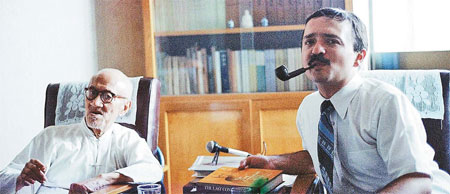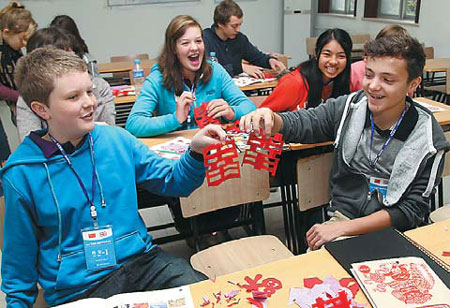Language on the tip of everybody's tongue
Updated: 2013-01-25 07:24
By Peng Yining (China Daily)
|
||||||||
|
Guy S. Alitto interviews the Chinese philosopher Liang Shuming in Beijing in this 1980s file photo. Provided to China Daily |
|
Some British children learn how to make paper cuts at a Chinese culture summer camp in Xi'an, the capital of Shaanxi province. Yuan Chen / for China Daily |
The increase in the number of students majoring in Chinese studies has accompanied the country's economic rise, as Peng Yining reports from Beijing.
Guy S. Alitto simply dived into the vast pool of classical Chinese when he first tried to learn the language as an adult in the 1960s, but quickly found out that the "sink or swim" approach just doesn't work with the language.
Even after two years of huffing and puffing up the steep slopes of classical texts such as the Analects of Confucius and Mencius, Alitto, then a graduate student majoring in Chinese history at the University of Chicago, couldn't use the language to order food at Chinese restaurants, and couldn't even say ni hao, or hello, accurately.
"We were supposed to learn modern Chinese first and then wen yan wen (classical Chinese), but nobody really knows how it should work," said Alitto in fluent Mandarin. He is now professor of history at the University of Chicago. "At that time, people were not interested in less-developed countries like China. Chinese was an unpopular subject; few people studied it and even fewer knew how to teach it."
Back in the 1960s, hardly any universities in the United States taught courses about China, the exceptions being a couple of elite Ivy League schools. But even in those establishments, knowledge was limited. Some professors could breeze through oracle bones, a form of Chinese script consisting of characters carved into the shoulder bones of oxen or turtle shells, dating from the Shang Dynasty (circa 16th century-11th century BC), but were unable to construct a complete sentence in modern Chinese, he added.
Alitto acquired his Chinese name from his graduate adviser: Ai Kai, which means "optimistic and easily contented". The name was apt: "You had to be very optimistic to be a sinologist at that time," he admitted.
But now, almost every university in the US has courses in Chinese. Alitto's class at the University of Chicago, Introduction to Chinese Civilization, saw undergraduate numbers grow to 127 last year from 70 to 80 just a few years ago.
"More students have become interested in China year-on-year," he said. "If you put the number of students studying Chinese and China's GDP on a graph, they match perfectly.
"Just as the song says, 'The whole world is learning Chinese'," he said, quoting the band S.H.E from Taiwan. "China's booming economy has attracted the world's attention and has also produced a marvelous growth in Chinese studies in the academic field."
In the 1940s, only 26 people studied Chinese language and culture at universities in the United Kingdom. By the 1990s, there were 160 China specialists working in the UK, 60 percent of them conducting research into modern China, according to a report from the National Research Center of Overseas Sinology in Beijing.
The report noted that in 1963 there were 33 people in the US with a doctorate in Chinese studies. However, by 1993, there were more than 10,000 China specialists working for the government or universities, or in business and the media.
In the 19th century there were no academic bodies that specialized in Chinese studies in the US, but by 2012, the number had reached 250. Currently, Harvard University alone boasts more than 10 organizations related to Chinese studies.
"But more important, non-specialists have also developed their knowledge about China and are interested in China. I mean businessmen, school teachers and publishers," said Ross Terrill, a China specialist and research associate at Harvard University's Fairbank Center for Chinese Studies. "Knowledge about China has moved away from pure sinologists. It has jumped out of the box, which is excellent, because understanding China involves various disciplines."
Terrill said there are many students from China on Harvard's campuses, and the Confucius Institutes, government-backed centers that promote the country and its language, have promoted China for a long time. When US nationals travel to South America or Africa, they notice the scale of Chinese projects. "China is part of the world now, not just a place for sinologists to study. You can see for yourself," he said.
Terrill said there are many areas available to people who want to be China specialists. "For instance, we need to read more deeply about China. If you want to write a doctoral thesis on the life of Chiang Kai-shek, we might need it, because the picture hasn't been totally filled in," he said.
He said there are fields that didn't exist 30 years ago, such as Chinese law. "Now China is building a legal system. People are now able to sue each other. But I didn't even feel that when I was a student," he said. However, foreign sinologists should be purely objective, according to Terrill. "They cannot be like priests announcing a truth with authority," he said. "We only have the authority to tell the facts as we find them."
In the 1980s, Terrill published a biography of Mao Zedong, the Chinese translation of which has sold more than 1.8 million copies in China. "I think I am objective in my book on Mao. This is the advantage of being a foreign sinologist," he said. "But the disadvantage was that I didn't feel fully immersed like those people who lived during the Mao era. I just tried to understand what Mao tried to do, to follow his contradictions, achievements and his failures, and also draw a picture of Mao as a man and of his wife. Chinese readers didn't know a lot about Mao's personal life until my book."
Opening the doors
China has become more open to foreign sinologists during the past few decades, said Alitto. When he first arrived in Zouping county in Shandong province for a field study in the 1980s, the local government was so wary that it told villagers to be careful about talking to the foreigner.
"I didn't know people were avoiding me, until a boy pointed at me and shouted 'That's him!' before he ran off," said Alitto.
In 2012, he delivered a lecture on the Chinese philosopher Liang Shuming and Confucianism, at Beijing Foreign Studies University. When he walked into the lecture hall, applause and cheers burst from the 500-strong audience, so Alitto made a bow with his hands folded in front, a traditional Chinese way of greeting people.
Unlike the old days when he was a student, even some high schools in the US teach Chinese now and people can easily visit or live in China. The digitalization of libraries has also made international research much easier, he said. Before, he had to travel from Chicago to Taiwan to study a document that is now available at the click of a mouse.
A lot of academic research conducted by Chinese scholars has been prompted by foreign sinologists, such as work on the Dunhuang manuscripts, a number of religious and secular documents discovered in 1900 in caves in Dunhuang city in Gansu province, according to Gu Jun, a professor of history at the China Research Center of Overseas Sinology.
Gu said foreign sinology also brings new ideas and methodologies. For instance, some overseas observers don't lavish as much praise on the author Lu Xun as Chinese scholars do. Others debate the gender of Jia Baoyu, the main character in A Dream of the Red Mansions, one of China's four classic novels.
Meanwhile, some analyze the Analects of Confucius from a feminist angle. "In the famous Confucian saying, 'If three of us are walking together, at least one of the others is good enough to be my teacher', feminists will ask if there was a woman in the 'three', but Chinese scholars would never ask a question like that," said Gu. "It's hard to question the classics if you have never thought you were able to. I am not saying all of their ideas are right, but they have encouraged Chinese scholars to think outside the box through the new sociological research methods they've introduced," he said.
Without the language barrier, Chinese scholars enjoy an obvious advantage, but they still need to learn from foreign experts and undertake rational criticism. The past decade saw a development whereby the world paid attention to China and in turn China promoted its culture, he added.
First founded in 2004, Confucius Institutes can now be found in more than 100 countries and regions and have more than 500,000 registered students across the world.
In the past five decades, China's Foreign Language Press has published approximately 20,000 books, ranging from novels and politics to scholarly research, in 43 languages in more than 100 countries, around 40 million copies in total.
"I am worried that people are paying too much attention to China's booming economy, rather than its history, culture and traditions. Most students turn to China in search of better opportunities. But once the economic boom stops, Chinese studies will decline," said Gu.
Ralph Weber, a senior researcher and lecturer of Chinese philosophy at the University of Zurich in Switzerland, said China's economic success should not be the only reason for people to study it.
"It's just like when Japan's economy was stronger, Japanese studies boomed for a while. Before that, there were few non-European history classes in Switzerland, but now we have many. This is a major change and a healthy development," he said.
He said sinological studies were conducted worldwide before China achieved its current position and so it's incorrect to say a culture is only worth studying because it is powerful. "People shouldn't be utilitarian," he said. "Other cultures, like African culture, are worth studying, even if no one says they are on the rise."
Contact the reporter at pengyining@chinadaily.com.cn
(China Daily 01/25/2013 page5)

 In Photos: 7.0-magnitude quake hits Sichuan
In Photos: 7.0-magnitude quake hits Sichuan
 Li Na on Time cover, makes influential 100 list
Li Na on Time cover, makes influential 100 list
 FBI releases photos of 2 Boston bombings suspects
FBI releases photos of 2 Boston bombings suspects
 World's wackiest hairstyles
World's wackiest hairstyles
 Sandstorms strike Northwest China
Sandstorms strike Northwest China
 Never-seen photos of Madonna on display
Never-seen photos of Madonna on display
 H7N9 outbreak linked to waterfowl migration
H7N9 outbreak linked to waterfowl migration
 Dozens feared dead in Texas plant blast
Dozens feared dead in Texas plant blast
Most Viewed
Editor's Picks

|

|

|

|

|

|
Today's Top News
Live report: 7.0-magnitude quake hits Sichuan, heavy casualties feared
Boston suspect cornered on boat
Cross-talk artist helps to spread the word
'Green' awareness levels drop in Beijing
Palace Museum spruces up
First couple on Time's list of most influential
H7N9 flu transmission studied
Trading channels 'need to broaden'
US Weekly

|

|









